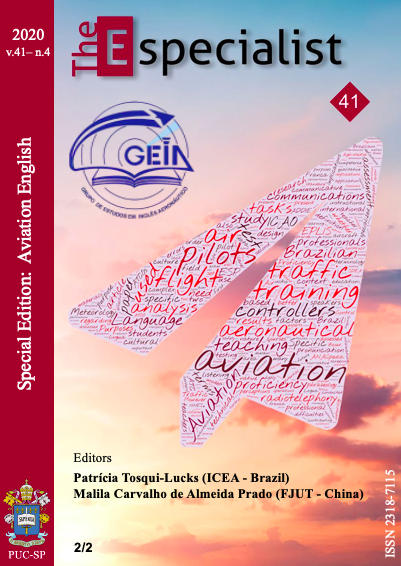English Language Proficiency in Radiotelephony: A survey about its effect on the safety and efficiency of aviation
DOI:
https://doi.org/10.23925/2318-7115.2020v41i4a9Keywords:
Aviation, Radiotelephony, English, Safety, EfficiencyAbstract
The purpose of this paper is to reveal and discuss evidence that the safety and efficiency of international aviation continues to be adversely impacted by poor English language proficiency over the radio. In 2011, all members of the International Civil Aviation Organisation (ICAO) were declared to be compliant with regards to the English language testing of all pilots and air traffic controllers (ATCOs). However, language experts have continued to raise concerns about the regulatory framework of Language Proficiency Requirements (LPRs) and about whether an international standard of English language proficiency has truly been established. This paper describes the analysis of responses given by pilots and ATCOs to a survey which addressed the nature and frequency of poor language proficiency that they experience during flights. The data show evidence that there continues to be a problem of language proficiency among pilots and ATCOs, that this problem is encountered relatively frequently and that some regions of the world are experiencing it more acutely than others.
References
ALDERSON, J. 2009. Air Safety, Language Assessment Policy, and Policy Implementation: The Case of Aviation English. Annual Review of Applied Linguistics. 29: 168-187
_______. 2010. A Survey of Aviation English Tests. Language Testing. 27.1: 51-72
BARSHI, I.; C. FARRIS. 2013. Misunderstandings in ATC Communication: Language, Cognition, and Experimental Methodology. New York, USA: Ashgate Publishing Ltd.
BOEING. 2020. 2020 Pilot and Technician Outlook. Available at: <https://www.boeing.com/commercial/market/pilot-technician-outlook/ >. Access: 24 oct 2020
CAMPBELL-LAIRD, K. 2004. Aviation English: A review of the language of international civil aviation. Paper presented at the International Professional Communication Conference. Piscataway, New Jersey, USA.
CLARK, B. 2017. Aviation English Research Project: Data analysis findings and best practice recommendations. West Sussex: UK CAA, UK
EMERY, H. 2014. Developments in LSP Testing 30 Years On? The Case of Aviation English. Language Assessment Quarterly. 11.2: 198-215
ESTIVAL, D.; B. MOLESWORTH. 2011. A Study of EL2 Pilots' Radio Communication in the General Aviation Environment. Australian Review of Applied Linguistics. 32.3: 24.1-24.16
FARRIS, C. 2007. The effects of message length, L2 proficiency and cognitive workload on performance accuracy and speech production in a simulated pilot navigation task. Master's Dissertation, Concordia University.
GARCIA, A. 2015. What do ICAO Language Proficiency Test Developers and Raters Have to Say about the ICAO Language Proficiency Requirements 12 Years after their Publication? Master's Dissertation, Lancaster University.
AGÊNCIA NACIONAL DE AVIAÇÃO CIVIL (ANAC). 2016. The need for revision of Annex 1 language proficiency SARPs for pilots and air traffic controllers. A39-WP/249. International Civil Aviation Organization. Montreal, p. 1-4.
INTERNATIONAL CIVIL AVIATION ADMINISTRATION/ICAO. 2010. Manual on the Implementation of ICAO Language Proficiency Requirements Second Edition: Doc 9835. Montréal: Canada.
_______. 2011. Annex 1 to the Convention on International Civil Aviation: Personnel Licensing. Montréal: Canada.
KIM, H.; C. ELDER. 2009. Understanding aviation English as a lingua franca. Australian Review of Applied Linguistics. 32.3: 23.1-23.17
_______. 2015. Interrogating the construct of aviation English: Feedback from test takers in Korea. Language Testing. 32.2: 129-149
KNOCH, U. 2014. Using subject specialists to validate an ESP rating scale: The case of the International Civil Aviation Organization (ICAO) rating scale. English for Specific Purposes. 33: 77-86
KROSNICK, J.; S. PRESSER. 2010. Question and Questionnaire Design. In: MARSDEN, P.; J. WRIGHT (Ed). Handbook of Survey Research. Bingley: Emerald Group Publishing. p. 263-313.
MALHOTRA, N. 2006. Questionnaire Design and Scale Development. In: GROVER, R.; VRIENS, M. (Eds.). The Handbook of Marketing Research. London: Sage Publications. p. 83-93
MODER, C.; HALLECK, G. 2009. Planes, politics and oral proficiency: Testing international air traffic controllers. . Australian Review of Applied Linguistics. 32.3: 25.1-25.16
MONTEIRO, A. 2012. Radiotelephony communications: Threats in a multicultural context. Aviation in Focus. 3.2: 44-66
PHILPS, D. 1991. Linguistic security in the syntactic structures of air traffic control English. English World-Wide. 12.1: 103-124
PRADO, M. 2019. Fluency in Aviation English: The path to its description through corpus linguistics. In: DEGAND, L.; G. GILQUIN; L. MEURANT; A. N. SIMON; (Eds) Fluency and Disfluency Across Languages and Language Varieties. Proceedings of Corpora and Language in Use, Louvain-la-Neuve: Presses universitaires de Louvain, p. 159-173.
PRINZO, V.; A. HENDRIX; R. HENDRIX. 2008. Pilot English language proficiency and the prevalence of communication problems at five U.S. Air Route Traffic Control Centers. Washington DC: FAA, USA
RATTRAY, J.; M. JONES. 2007. Essential elements of questionnaire design and development. Journal of Clinical Nursing. 16: 234-243
TIEWTRAJUL, T.; S. FLETCHER. 2010. The challenge of regional accents for aviation English language proficiency standards: A study of difficulties in understanding in air traffic control-pilot communications. Ergonomics. 53.2: 229-239
TRIPPE, J.; M. BAESE-BERK. 2019. A prosodic profile of American Aviation English. English for Specific Purposes. 53: 30-46
VANMOERE, A.; M. SUZUKI; R. DOWNEY; J. CHENG. 2009. Implementing ICAO language proficiency requirements in the Versant aviation English test. Australian Review of Applied Linguistics. 32.3: 27.1-27.17
WILLIAMS, G. 2016. Solutions for Improving the Safety of Aviation Communication. Master's Dissertation, University of Leicester
Downloads
Published
How to Cite
Issue
Section
License
The authors grant the journal all copyrights relating to the published works. The concepts issued in signed articles are the absolute and exclusive responsibility of their authors.


 Esta obra está licenciada com uma Licença
Esta obra está licenciada com uma Licença 